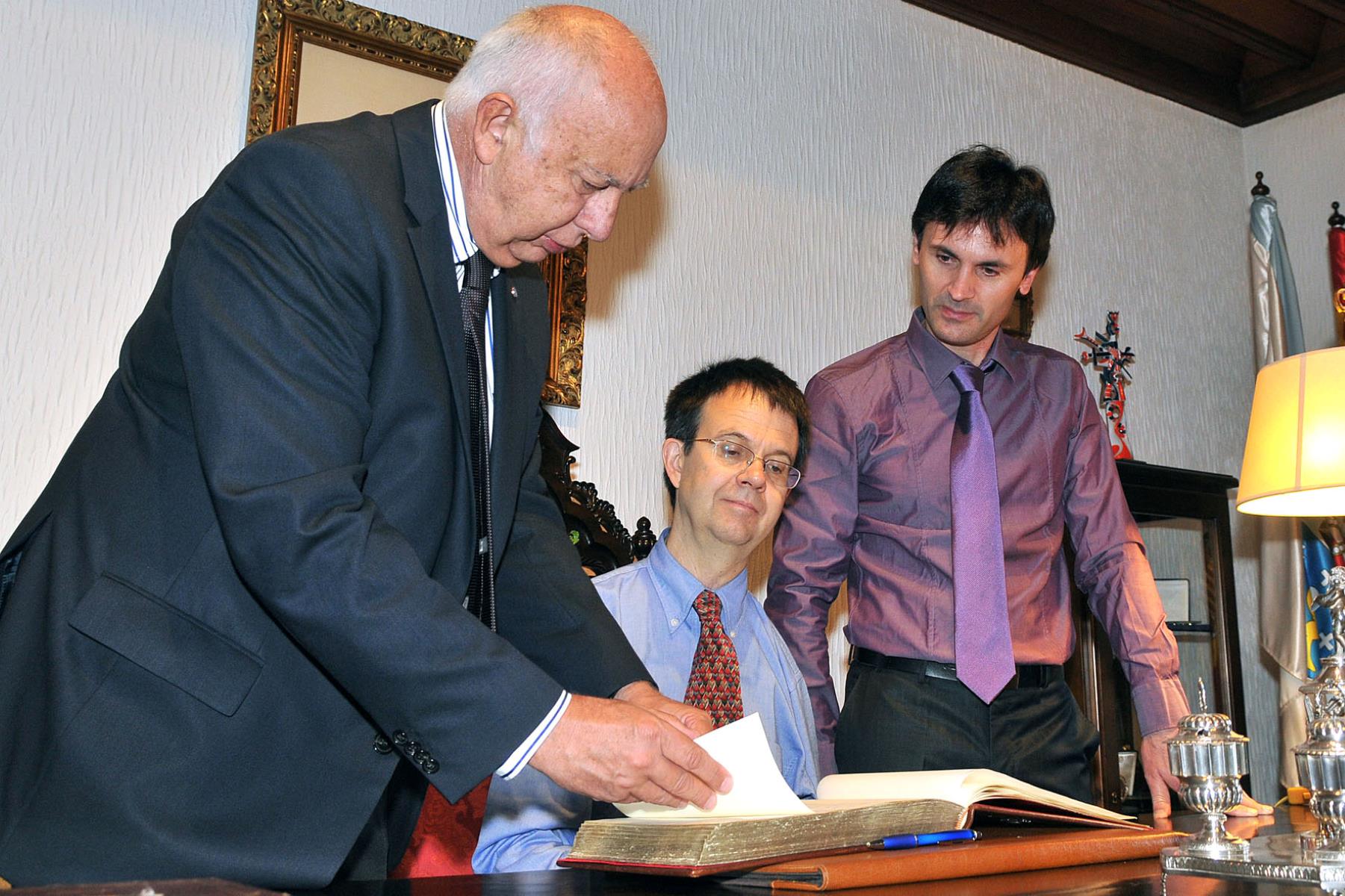
Dr. Eric Allin Cornell is a renowned physicist whose groundbreaking research has earned him international recognition. With a brilliant mind and insatiable curiosity, Dr. Cornell has made significant contributions to the field of physics, particularly in the study of ultra-cold atoms and Bose-Einstein condensates.
In this article, we will explore 15 unbelievable facts about Dr. Eric Allin Cornell, shedding light on his incredible achievements and notable discoveries. From his early life and educational background to his revolutionary experiments and prestigious accolades, we will delve into the fascinating world of a scientific genius.
So, buckle up and prepare to be astonished as we uncover the remarkable story of Dr. Eric Allin Cornell, a man who has made extraordinary strides in pushing the boundaries of our understanding of the universe.
Key Takeaways:
- Dr. Eric Allin Cornell won the Nobel Prize in Physics for his work on ultracold atoms and quantum physics, paving the way for groundbreaking advancements in the microscopic world.
- His research has not only revolutionized our understanding of the universe at its smallest scales, but also inspired future generations of physicists through his lectures and public engagements.
Nobel Prize Winner
Dr. Eric Allin Cornell is a renowned physicist who was awarded the Nobel Prize in Physics in 2001 for his groundbreaking work in the field of Bose-Einstein condensates.
Pioneer in Quantum Physics
Dr. Cornell’s research on ultracold atoms and the nature of quantum physics has revolutionized our understanding of the microscopic world.
Co-Creator of the First Bose-Einstein Condensate
Working with his colleague, Carl E. Wieman, Dr. Cornell successfully produced the first Bose-Einstein condensate in 1995, a state of matter that had previously only existed in theory.
Cornell-Wieman Experiment
The Cornell-Wieman experiment is widely regarded as a milestone in the field of physics and has paved the way for numerous breakthroughs in quantum mechanics.
Low Temperatures and High Achievements
Dr. Cornell’s experiments require extremely low temperatures, approaching absolute zero, where atoms slow down and exhibit quantum effects.
A Journey into the Microscopic World
By studying the behavior of atoms at ultracold temperatures, Dr. Cornell has provided valuable insights into the fundamental principles that govern the universe at its smallest scales.
Contributions to Atomic Clocks
Dr. Cornell’s work has also contributed to the development of highly accurate atomic clocks, which serve as the standard for measuring time.
Educator and Mentor
Besides his groundbreaking research, Dr. Cornell is also a dedicated educator and has mentored numerous students and young scientists in the field of quantum physics.
Fellow of Prestigious Institutions
Dr. Cornell is a fellow of the American Physical Society and the Optical Society of America, recognizing his significant contributions to the field of physics.
International Recognition
His work has earned him international recognition, and he has been honored with several prestigious awards and accolades throughout his career.
Collaborations and Partnerships
Dr. Cornell has collaborated with scientists from around the world, fostering partnerships that have led to groundbreaking advancements in quantum physics.
Inspiring Future Generations
Through his lectures and public engagements, Dr. Cornell strives to inspire the next generation of physicists and instill a sense of curiosity and wonder about the universe.
Quantum Computing
Dr. Cornell’s research has implications for the field of quantum computing, a revolutionary approach to computing that utilizes the principles of quantum mechanics.
Author and Speaker
He has authored numerous scientific papers and is a sought-after speaker at conferences and symposiums around the world.
Legacy of Scientific Discovery
Dr. Eric Allin Cornell leaves behind a lasting legacy of scientific discovery and has played a pivotal role in advancing our understanding of the quantum world.
Conclusion
Dr. Eric Allin Cornell is undeniably an extraordinary figure in the field of physics and scientific research. His contributions to the study of Bose-Einstein condensation and his groundbreaking experiments have pushed the boundaries of what we thought was possible.
From his early education at Stanford University to his Nobel Prize-winning work at the Joint Institute for Laboratory Astrophysics, Dr. Cornell has demonstrated a remarkable intellect and unwavering dedication to advancing our understanding of the universe.
With a career spanning decades, Dr. Cornell’s scientific achievements have not only earned him numerous accolades but have also paved the way for future generations of physicists to follow in his footsteps.
Without a doubt, Dr. Eric Allin Cornell’s remarkable journey serves as an inspiration to aspiring scientists around the world, reminding us of the power of curiosity, perseverance, and the pursuit of knowledge.
FAQs
1. What is Dr. Eric Allin Cornell known for?
Dr. Eric Allin Cornell is best known for his pioneering work in the field of physics, particularly his contributions to the study of Bose-Einstein condensation. This groundbreaking achievement earned him the Nobel Prize in Physics in 2001.
2. Where did Dr. Eric Allin Cornell receive his education?
Dr. Cornell obtained his bachelor’s degree in physics from Stanford University in 1985. He then went on to earn his Ph.D. in physics from the Massachusetts Institute of Technology (MIT) in 1990.
3. What is Bose-Einstein condensation?
Bose-Einstein condensation is a phenomenon that occurs at extremely low temperatures, close to absolute zero. It is characterized by the collective behavior of a group of bosons, particles that can occupy the same quantum state. This groundbreaking discovery has opened up new avenues of research and has shed light on the nature of matter.
4. How did Dr. Cornell’s work impact the field of physics?
Dr. Cornell’s work on Bose-Einstein condensation revolutionized the field of physics, providing scientists with a deeper understanding of quantum mechanics and the behavior of matter at extremely low temperatures. His work has inspired further research and has led to significant advancements in the field.
5. What other notable achievements has Dr. Eric Allin Cornell accomplished?
In addition to his groundbreaking work on Bose-Einstein condensation, Dr. Cornell has made significant contributions to the study of ultra-cold atomic gases, quantum mechanics, and quantum optics. His research has had a profound impact on the field of physics and has garnered him numerous awards and recognition.
Inspired by Dr. Cornell's groundbreaking work? Dive deeper into the fascinating world of physics and discover more incredible scientists. Uncover the mind-blowing achievements of Roger Penrose, a Nobel Prize winner who revolutionized our understanding of the universe. Explore the life and work of Lise Meitner, a pioneer in atomic physics, whose contributions changed the course of history. Finally, prepare to be amazed by the strange and captivating phenomena of quantum superposition, a fundamental principle of quantum physics that challenges our perception of reality.
Was this page helpful?
Our commitment to delivering trustworthy and engaging content is at the heart of what we do. Each fact on our site is contributed by real users like you, bringing a wealth of diverse insights and information. To ensure the highest standards of accuracy and reliability, our dedicated editors meticulously review each submission. This process guarantees that the facts we share are not only fascinating but also credible. Trust in our commitment to quality and authenticity as you explore and learn with us.


